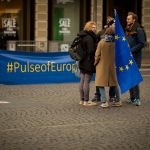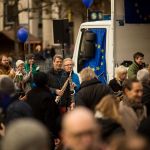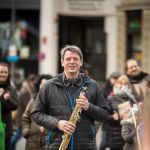… and the crowds are getting bigger! This Sunday saw another demonstration for Europe on the Goetheplatz in Frankfurt. This time the demonstration was even supported by some live music.
This has been my fourth Pulse of Europe demonstration. The speakers at the events all share an enthusiasm for Europe. Many recall a time when Europe was less united; when it was not so easy to roam so freely in Europe, be it for work or travel. All speakers are usually met with ample applause. There are two topics, though, where the applause is mixed:
- The economic situation in Europe. Is the South dragging down Germany, or is Germany imposing an impossible straight jacket on the South?
- Has Europe been too open to refugees, or are we not doing enough?
These two topics are central to the future of Europe. Leave them as they are and they have the potential to tear Europe apart. Anyone who wants a future for Europe needs to have a position on these issues. (For the economic question I have sketched my position in this blog here, here, here, here, and here.)
Let the discussion begin!























“Has Europe been too open to refugees, or are we not doing enough?”
This topic is incredibly complex and riddled with nuance. That makes it difficult to discuss because we often want to break something down into pro- and anti-groups. Those who are for or against. That can be alienating from the start.
Instead I would love to see the question completely re-framed to foster a more inclusive discussion like, “How should we best approach and implement refugee policy in a simultaneously humane and safe way?” or “What elements of refugee policy can we improve?” or “What are your concerns and how can we address them?”.
Right off the bat I would say we need more organization, cooperation and administrative resources. Where’s the EU task force? Does one already exist because I don’t know of one. Ideally, we would have a group of individuals from concerned countries working together to create an actual high-level plan that is communicated to everyone, then implemented on a local level and addresses:
1. Immediate relief of suffering (shelter, food, clothing).
2. Transportation.
3. Administrative needs and resources (remember the HUGE processing back-log?, people have real concerns about vetting and knowing who is coming in and from where, lack of resources leads to confusion for refugees and locals alike and has had disastrous effects).
4. Community engagement (activating and coordinating volunteers or mentoring programs, could help with #3).
5. Constant communication about the plan, feedback loop to feed information from local to EU level and EU level back down to local.
6. Medium, then long term goals/needs.
7. Collect data on refugee’s language and other skills so they can be matched with tasks that need to be done (goes with #3 and #6).
As much as Trump says they don’t, the US has incredibly complex and thorough vetting. It takes up to two years for a refugee to receive a visa. They have this time as a luxury because the refugees are not at their borders. However, if they wanted they could take people to Guam and use the island as a temporary processing center while the paperwork is done. People would be out of danger, schools could be set up for the kids. Refugees lives would not be left completely on hold.
Compare this with the approach of refugees coming in from Central America. They are picked up by border control, given a court date sometimes years into the future and then can travel throughout the US. It’s easy to slip through the cracks. The administrative resources have not been provided to handle the workload.
I would love to see Europe look to these examples as well their own and extract some lessons learned. Where you have the luxury of land/shelter for processing, use it. Where an ally has it, borrow it (Guam?). Where you don’t, immediately ramp up and train administrative staff. Tap some of the refugees to help with administrative tasks, translating, appoint “community organizers” within the groups and match them with a local native counterpart. Activate the local population to help and collect feedback from them so that they have personal contact with the refugees, feel part of the process and like they have some control and input. Ask them what might help to ease the burden of the extra population and what they can do or offer in return.
Anytime we discuss refugee policy we should be looking at these things. If it’s simplified down to taking in more or less people I think we miss a huge opportunity for humanity to rise to the occasion, understand each other’s concerns and come out with the best possible result.